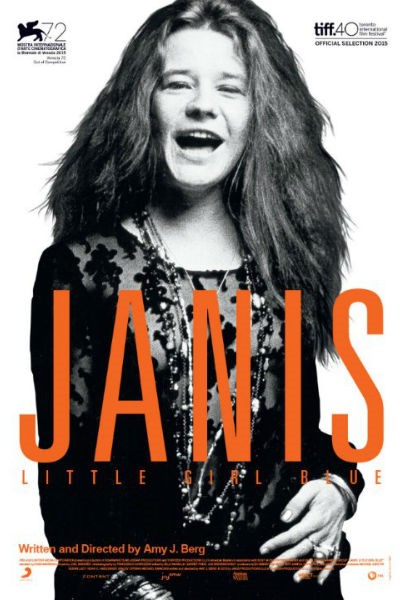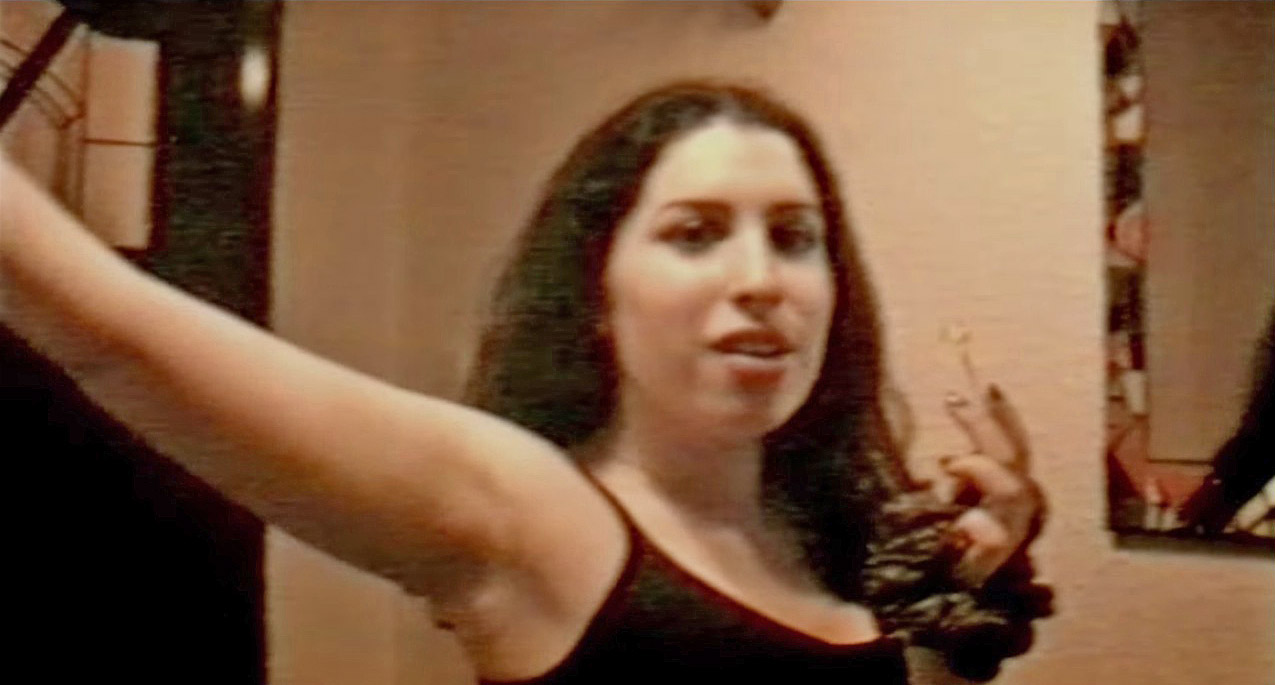Amy, Marlon, Janis and Kurt's Documentaries Raise Ethical Questions
 Friday, November 27, 2015 at 1:30PM
Friday, November 27, 2015 at 1:30PM  Glenn here. As the world of documentary filmmaking grows and grows, biography docs are among the most popular and easiest to sell. This pre-sold name-brand familiarity makes them more desirable to financiers, producers, directors, distributors, exhibitors, festivals, and ultimately audiences. It’s hardly surprising that of the Academy’s 124-strong long-list (to be narrowed to 15 any day now) at least 20 cover the life of a famous person in the public eye. And if you want to stretch the parameters to include institutions such as National Lampoon, Saturday Night Live, Tower Records, The Black Panthers, The Bolshoi Theatre etc, the number balloons. They are also among the highest profile submissions, too, with names like Nina Simone, Evel Kenievel and Chris Farley simply standing out more than geo-politics, homophobia in the Middle East, or Cambodian rock and roll.
Glenn here. As the world of documentary filmmaking grows and grows, biography docs are among the most popular and easiest to sell. This pre-sold name-brand familiarity makes them more desirable to financiers, producers, directors, distributors, exhibitors, festivals, and ultimately audiences. It’s hardly surprising that of the Academy’s 124-strong long-list (to be narrowed to 15 any day now) at least 20 cover the life of a famous person in the public eye. And if you want to stretch the parameters to include institutions such as National Lampoon, Saturday Night Live, Tower Records, The Black Panthers, The Bolshoi Theatre etc, the number balloons. They are also among the highest profile submissions, too, with names like Nina Simone, Evel Kenievel and Chris Farley simply standing out more than geo-politics, homophobia in the Middle East, or Cambodian rock and roll.
This sub-category of documentary were once considered more frivolous and less serious, but have recently begun to win Oscar attention with titles such as Exit through the Gift Shop, Man on Wire, and even Wim Wenders’ Pina and Salt of the Earth. As a result, ethical questions about this kind of documentary filmmaking are rising up. I know it doesn't sound sexy, but bear with me for Amy Winehouse, Marlon Brando, and other luminaries after the jump....

While some of the biographies on offer this year are about people who are still with us – Raf Simons, Pras Michel, Tab Hunter – and, thus, at least somewhat tailored to their wants and desires, most are not. Take Amy, Asif Kapadia’s box office hit doc about British singer Amy Winehouse. It has continued to bug me months after seeing it that the filmmakers go out of their way to remind audiences how desperate the singer was for privacy, only to then utilize video that she would have never wanted the world to see. Winehouse, driven to death as she was in part by the scrutiny of the press and the hounding of the paparazzi, was now not even being allowed a dignified privacy in death by essentially taking away whatever secrets she had and showing them to the world. It is part of our own morbid fascination with the private lives of celebrities, sure, but to what ends?
Perhaps my continued niggling about this comes down to having other issues with the film, but it is nonetheless something that I find increasingly hard to ignore when discussing the film (which is now available on DVD & BluRay). For, on the other hand, and despite similar concerns, I was greatly impressed by Stevan Riley’s Listen to Me Marlon. I enjoyed the way it elegantly glided through the career of Marlon Brando, using his own words as a poetic testament to his life and career, matched by curious visual feats and a great use of archival footage that is presented simply, yet beautiful. As the credits rolled I felt like I had watched a wonderful film, but again found myself querying what Brando himself would think of his private audio tapes – some of them painful, all of them deeply personal – being used in such a fashion.
As Amir mentioned in his review last April, the tapes were donated to the project by the Brando estate. And here, when blended with other recordings (like a digital scanning Marlon had in the '90s when he believed computers would take over from actors), it's hard to tell what is what. Still, they have the aura of therapeutic confessional and they were packed away, presumably not intended to heard and yet here we are listening to them in 2015.

Of course, it is undoubtable that these types of previously untouched products give their films a dramatic and narrative edge. Amy wouldn’t have quite the same impact as a singular vision of the rise and fall of a spectacularly talented yet equally spectacularly flawed superstar without the insights granted by the videos of her early life as well as the footage of the daily houndings by the global media that made her life a living hell of media sensationalism. Likewise, Listen to Me Marlon would likely not be anything we couldn’t get from Wikipedia (or maybe at best, a half-decent biography) without the audio tapes that give the film its backbone.
So what then of a film like Amy Berg’s Janis: Little Girl Blue about the life of Janis Joplin, which apart from som half-interesting letters from Janis Joplin to her mother (narrated by Chan Marshall of Cat Power and lent out by her estate) lacks anything truly special to set it apart from any number of similar documentaries. In fact, many of the film's archival clips are recycled from Howard Alk’s 1974 doc Janis like the wonderful footage of Joplin and her band recording Cheap Thrills, shot by D.A. Pennebaker. Surely there’s not much here that couldn’t be gleaned from Google, and so Berg’s film can’t help but feel inessential. I did, however, appreciate that Berg focused predominantly on Joplin the artist and not on the tragic downfall which (per my complaints from my review of Amy) is too often the central focus of films about artists like Joplin. 45 years after Joplin’s passing, Janis: Little Girl Blue sheds little new light on its subject.
 My favourite of the bio docs this year is Kurt Cobain: A Montage of Heck. Many months after screening I still delight at the mix of forms (those animations are excellent), the scintillating editing, the way it seeks to understand his relationship with Courtney Love, and the way it doesn’t resort to hagiography, but instead digs deep into the life of a man who was complex and trouble-plagued and whose legacy has far outweighed any lasting understanding while winking that maybe some things aren't as they seem. Yet again, a lot of the documentary’s power comes from previously unseen footage as well as access to his diaries.
My favourite of the bio docs this year is Kurt Cobain: A Montage of Heck. Many months after screening I still delight at the mix of forms (those animations are excellent), the scintillating editing, the way it seeks to understand his relationship with Courtney Love, and the way it doesn’t resort to hagiography, but instead digs deep into the life of a man who was complex and trouble-plagued and whose legacy has far outweighed any lasting understanding while winking that maybe some things aren't as they seem. Yet again, a lot of the documentary’s power comes from previously unseen footage as well as access to his diaries.
Am I blinded to the usual ethical quandaries simply because I like this film better? Because I feel director Brett Morgen did a better job at getting into the mindset of its subject? Then again, is that not the case with so much in life – we easily forgive people whose work we like more than those we don’t. I found myself more deeply involved in Montage of Heck and Listen to Me Marlon than I did with Amy, but they each made me question myself and the world around me.
So I ask, do these people deserve to have their private lives raided for our enjoyment? And if doing so makes for a good movie, should we ultimately mind?



Reader Comments (5)
I never read gossip magazines or websites and I was deeply bothered by the sensationalist angle the director of Amy took. Upon watching that doc, I really didn't learn much about her process as an artist, her input in recordings, how her music relates to her personal life. If felt extremely invasive to me and if anything, it made me a little angry at the end that she is still being used by these vampires (including her family) even after her death. That is the brutal (and somewhat more interesting) narrative I took from it, one that is outside of the movie.
this is exactly why i avoided AMY after reading reviews. But then so many people say it's one of their favorites from the year that i'm torn.
on the other hand i'm kind of desperate to see LISTEN TO ME MARLON so perhaps i'm just a hypocrite when it comes to this :)
I love Amy, although I admit I didn't think about the film's problematic nature. As a fan of the movie and the singer, I felt like it grabbed some dignity back for her.
When she was alive, it was impossible to avoid some knowledge of how she was being covered and talked about. I think the doc does an excellent job of showing why her behavior was so fascinating to people who, otherwise could care less about an unshiny pop singer, and how multiple circumstances conspired to keep her down.
It's a very sad movie, but I was glad to have seen it.
Nathaniel, that's exactly it. I liked MARLON far more than AMY so not even I really know where I stand.
Mike, I've certainly heard from some people that they too thought the film worked to give Amy Winehouse so dignity in that now everyone can see that she wasn't just some selfish druggy but a real addict whose live in the limelight was not helping. I still feel a bit taken aback by it, though.
Goodbar, that was my main issue.
I agree with the idea that Amy was little more than a sensationalist snuff film. Harsh words perhaps, but I feel that the film didn't do the thing that celebrity biopics are meant to do at their best, and that is to help us understand a better sense of ourselves, of what it means to be a human being, through the invasive lens of celebrity. There's a moment in Listen to Me Marlon where he is clearly riled at the premiere of Guys and Dolls. I felt for him in that moment. Both Listen to Me Marlon and Montage of Heck seem to want to know more about the artists as artists and as humans in their experiences on this earth. What Happened Miss Simone was also good in this way. Amy was a feat of filmmaking (it couldn't have been easy sorting through all that footage) but it is somehow less than the some of it's parts. I have not seen Janis: Little Girl Blue, but at its base, sometimes it's worth a new take to reintroduce an artist to a new generation with a fresh voice. Another thing Listen to Me Marlon does well (Cobain never stopped being relevant).